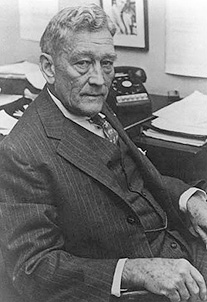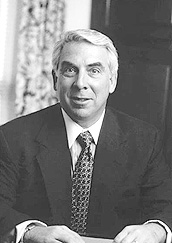 JOHN EAGER HOWARD, Med 1928, was a major figure in the development of the field of endocrinology and metabolism. Among his contributions were the discovery of the association between unilateral renal artery disease and high blood pressure, the development of the Ellsworth-Howard test to determine responsiveness to parathyroid hormone and the introduction of a highly effective approach to the prevention of recurrent kidney stones. A member of the faculty for nearly 60 years, Dr. Howard was the founder and first director of the Division of Endocrinology and Metabolism. In their history of the Hopkins Department of Medicine, Drs. Harvey, McKusick and Stobo wrote: “As much as anyone on the faculty, Dr. Howard was the epitome of sharp clinical acumen coupled with a wealth of scientific knowledge.”
JOHN EAGER HOWARD, Med 1928, was a major figure in the development of the field of endocrinology and metabolism. Among his contributions were the discovery of the association between unilateral renal artery disease and high blood pressure, the development of the Ellsworth-Howard test to determine responsiveness to parathyroid hormone and the introduction of a highly effective approach to the prevention of recurrent kidney stones. A member of the faculty for nearly 60 years, Dr. Howard was the founder and first director of the Division of Endocrinology and Metabolism. In their history of the Hopkins Department of Medicine, Drs. Harvey, McKusick and Stobo wrote: “As much as anyone on the faculty, Dr. Howard was the epitome of sharp clinical acumen coupled with a wealth of scientific knowledge.”
John Eager Howard Chair in Endocrinology and Metabolism
School of Medicine
Endocrinology
Established in 1990 by family, friends, colleagues, and patients in memory of John Eager Howard
Held by Paul W. Ladenson
PAUL W. LADENSON, MD, the John Eager Howard Professor of Endocrinology and Metabolism and Distinguished Service Professor, has been a faculty member since 1983. Dr. Ladenson served as the Director of the Division of Endocrinology, Diabetes, and Metabolism for more than twenty-six years of distinguished service. Dr. Ladenson continues to see patients, educate our future physicians and ensure a healthier future through ground-breaking research.
Dr. Ladenson, founder of the internationally renowned Johns Hopkins Thyroid Tumor Center, has made game-changing and influential contributions to the field of endocrinology as a researcher, educator and mentor. His leadership efforts have resulted in pioneering research with global implications in the field of endocrinology. These include the discovery and implementation of novel strategies for differentiating benign from malignant thyroid tumors through genetic testing, the prediction of thyroid cancer behavior with genetic profiling, and the use of recombinant human thyroid stimulating hormone to treat thyroid cancer patients with less morbidity.
Dr. Ladenson’s impact as an educator is evident from the more than 70 endocrine fellows who trained under his divisional leadership—many of whom are now prominent researchers and clinicians across the country and around the globe. Seven are themselves division directors at other prominent institutions. And of course, as his thousands of patients know so well, Dr. Ladenson has been an extraordinary clinician—insightful, clear thinking and compassionate in caring for those who have come from around the world the seeking his help.
